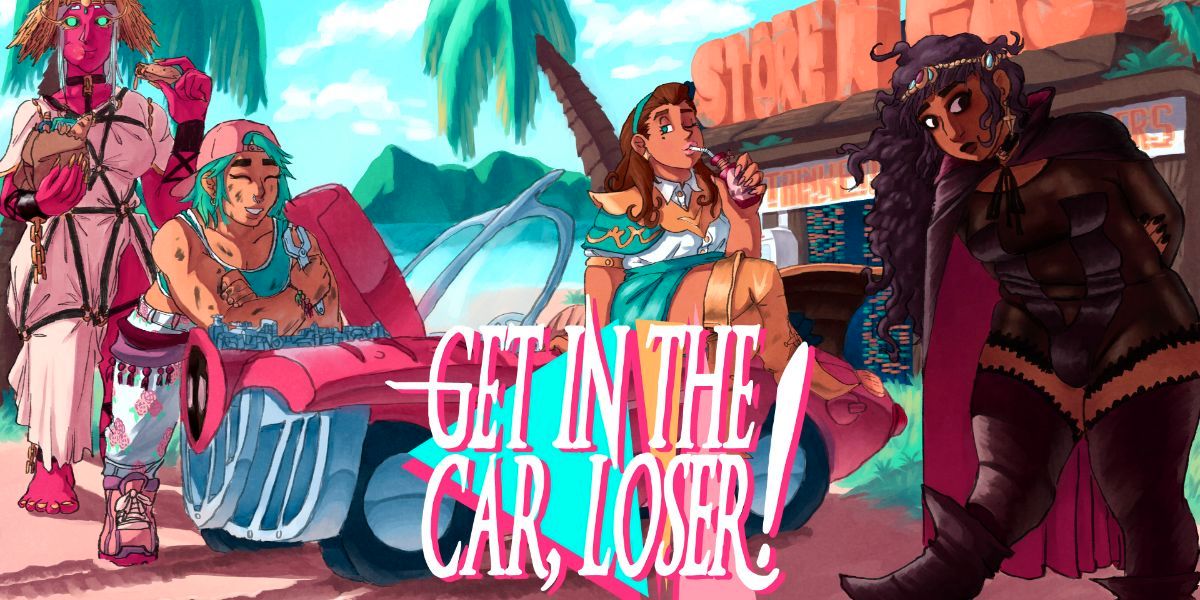LGBTQ+ representation in media is more common these days, though good representation can still be hard to come by. This holds true for video games as well, as big releases rarely include queer characters, with a notable exception coming from Naughty Dog's acclaimed The Last of Us series. LGBTQ+ themes often thrive within the indie community because of more creative freedom while writing stories, and that's precisely what Get in the Car, Loser! achieves thanks to the writing of Christine Love.
Game Rant spoke to Love about the new lesbian road trip RPG, which focuses on exploring a good story first and foremost through a varied party of queer characters. The protagonist, Sam, is a transgender woman and a lesbian, which is quite rare to come by - and she happens to be the character Love poured the most of herself into. The story is about fighting evil and discovering oneself during a road trip with friends, with heroic tones and dramatic dialogues Love had to balance before releasing the final version of Get in the Car, Loser! and its DLC on PC.
RELATED: All Destiny 2 LGBTQ+ Characters
How Christine Love Handles Storytelling and LGBTQ+ Representation

Representation of LGBTQ+ characters doesn't have to feel like a checklist to go through while telling a story according to Love, as this would hurt both the representation by making it shallow, and also the story by making it not believable. The visual novel writer thinks what's good about feeling represented is that people can see they are not alone in their struggles, and even if that representation doesn't make the audience feel the same way it can still be good. Good representation helps even when people disagree with the character on a one-to-one basis, she said, whereas shallow representation doesn't bring anything useful to the table.
"I think the issue that representation is really touching on is that people want to see themselves in characters and that things that are relevant to them are being expressed. I think that's what really matters. There's under-representation, and there's also shallow representation, which doesn't feel more satisfying to me."
Get in the Car, Loser! tries to tell a compelling story that's also fun and engaging, despite the main antagonists being a cult worshipping the evil Machine Devil. While every character is queer to a certain extent, this is not the only thing defining them throughout the game, as players get to explore their thoughts and personal struggles, such as Sam's anxiety and identity crisis. After all, when it comes to RPGs, the story is what matters.
"I'm mainly interested in telling a compelling story that people think is fun and engaging, and it has that good heroic narrative. I don't think you need to be exactly represented by all these bullet points or feel like Sam is a fun person to spend a lot of time with. It's gotta be a good story first in addition to what else you get from this narrative."
According to Love, one of the most crucial aspects when it comes to writing a good story is being true to reality, and that's why the narrative of stories focused completely on straight white people can miss out on what's true. Likewise, having such stories with a single or just a few queer characters to hit a diversity checklist can still lack authenticity. That's why Get in the Car, Loser! is not afraid to ask important questions like "what is evil?" when it comes to defining the group's enemies. Love wanted them to feel real, just as much as the main cast. The emotions in the game are meant to be real, first and foremost.
Get in the Car, Loser! is available now on PC.
MORE: Misc. A Tiny Tale Dev Talks About LGBTQ Themes and Celebrating Differences

